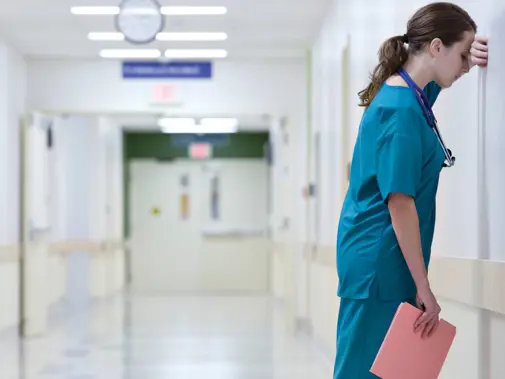The impact that the COVID-19 pandemic has had – and continues to have – on the mental health of doctors must not be underestimated, and action is needed now.
That was the very clear message from the BMA’s annual representative meeting, which has called on the Government and NHS to make resources widely and rapidly available for all healthcare workers who need mental health support.
Speaking for the BMA’s retired members forum, Buckinghamshire locum GP Gill Beck described the pressures that doctors had faced in 2020 – anxiety over a lack of PPE (personal protective equipment), the disproportionate impact on colleagues from ethnic minorities, the grief, the damage of having to watch impotently as non-COVID patients suffered due to the withdrawal of investigations and treatment.
She also cited the ongoing excess workload as doctors tried desperately to solve the backlog of care. ‘And there’s the increasing prevalence of neuropsychological symptoms associated with “long COVID” – the brain fog, cognitive dysfunction, reduced ability to process information, with the detrimental effect on mental health as doctors fear losing their careers.’
Lack of support
Where, Dr Beck asked, are the NHS plan and government resources to help these doctors?
It’s not as if it couldn’t have been anticipated – mental morbidity due to SARS was well-documented, she added. ‘So I ask again, where were the Government’s plans to manage the expected surge in mental ill health due to the pandemic?’
Existing support services such as the NHS practitioner health service lacked resources to deal with issues raised by COVID, and while the BMA’s wellbeing services were appreciated – and the fact it was working with the mental health charity Mind was welcomed – more needed to be done. Some LMCs were funding services for their GPs, other doctors were being referred to local talking therapy services with waiting times of up to six months.
‘What do our colleagues need – apart from a government that could give a damn?’ she asked. ‘Workplace recognition and support, rapid access to psychiatric and psychological services where needed, neuropsychiatric services integrated into multidisciplinary teams for long COVID patients.’
There was potential for colleagues to experience anxiety, grief, unresolved anger, depression, moral injury and even PTSD as a result of their experiences
Providing these services at scale and rapidly would be challenging, she conceded, but there’s a real need. She pointed to the BMA’s own survey in which 41 per cent of the members who responded reported mental ill health, and many said they had no access to NHS support services. ‘This is disgraceful – we are facing an epidemic, potentially, of mental ill health as staff struggle to cope with their COVID experiences. The Government must honour its obligations – our colleagues must be given the support needed to heal.’
She was backed by BMA council chair Chaand Nagpaul, who outlined some of the challenges faced by doctors during the pandemic. ‘There were some harrowing experiences – I had a junior doctor tell me how it felt to be looking after their consultant on a ventilator. That’s the sort of scenes and experiences doctors have faced.’
Doctors agreed that there was potential for colleagues to experience anxiety, grief, unresolved anger, depression, moral injury and even PTSD as a result of their experiences – and insisted that governments and NHS departments must without delay make resources widely and rapidly available for all health workers and carers who need mental health support.

